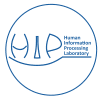Human interaction is heavily dependent on the processing of social signals originating from other people. The major goal of our research in the Human Information Processing Laboratory is to understand the cognitive, neural, and developmental mechanisms involved in the perception socially relevant information, and the factors contributing to individual differences in social information processing.

Research focus and goals
Our research is targeted on investigating processes involved in perception of human faces. The research seeks to respond to how facial information (e.g., facial expressions and gaze direction) influences observers’ attention, emotion, and motivation and, on the other hand, how attention, emotions, and motivation modulate perception of faces. These processes are studied in adults and in children at different stages of development.
The reseach also focuses on how neurobiological developmental disorders (autism spectrum disorder), psychiatric disorders, rearing environment, and the different characteristics of people, such as personality traits, affect these processes. HIP Lab is equipped with facilities for measuring physiological responses such as electroencephalography (EEG), electromyography (EMG), heart rate, skin conductance responses (SCR), and eye movements with eye-tracking systems. We also have a computer lab for behavioral studies and a room for observational assessments.
Leader
Jari Hietanen
Professor, Psychology Jari Hietanen
Jari HietanenMembers
Contact persons
Jari Hietanen
Professor (psychology)
jari.hietanen [at] tuni.fi
+358 40 190 1384







